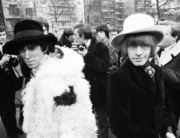At age 76, guitar legend Carlos Santana shows no signs of slowing down. The Grammy winner and Rock and Roll Hall of Fame member continues to perform for audiences around the world, playing songs from his six-decade career that hit its first peak with his band’s incendiary appearance at Woodstock in 1969 and then a second time exactly three decades later, when Santana’s 1999 album Supernatural and the hit song “Smooth” won eight Grammy Awards.
All of that and more is covered in the engaging documentary by director Rudy Valdez, which, in succinct 87 minutes, touches on many aspects of Santana’s life and career. The Mexican-born Santana is himself the son of a musician—his father, who played violin in a mariachi band, wanted his son to follow in his footsteps. Carlos started out playing that instrument but switched to guitar because, as he says, “I didn’t feel right. Nothing’s wrong with the violin—it was me.”
The teenage Carlos started playing in garage bands after his family moved to San Francisco from Tijuana, and one day he caught the eye—or ear—of rock impresario Bill Graham, who hired him and his eponymous band to play at area venues like the famous Fillmore West. Then, in the summer of 1969, Santana got a call from Graham asking if he’d like to play at a festival happening soon in rural New York State: Woodstock—and Santana’s career was made.
Valdez allows Santana to tell his story. He narrates the events of his life and career, accompanied by a parade of vintage footage—including previously unseen home movies—that highlight Santana’s prowess on the guitar throughout the decades, along with his appearances on talk shows with Merv Griffin, Dinah Shore, and David Letterman.
Santana is forthcoming on subjects ranging from his family (both parents were formidable in their own way—in fact, he describes his second wife, percussionist Cindy Blackman, as being as steely as his mother) to the racism he encountered as a teen. At a record store, three sailors’ outburst of invective was, as he says, “the first time I felt the sting of racism and ignorance.” He also discusses why he admitted in a 2000 interview in Rolling Stone to being sexually molested as 10-year-old. At first reticent to do so, he is grateful that his admission has helped others deal with their feelings of guilt about being abused.
Since Carlos was made before the controversy over Santana’s remarks about transgender individuals at a concert in July—which he later walked back, kind of—that recent blight on his reputation is, by an accident of timing, conspicuous by its absence. But that doesn’t take anything away from Valdez’s entertaining tribute to one of rock’s greatest musicians.

















Leave A Comment